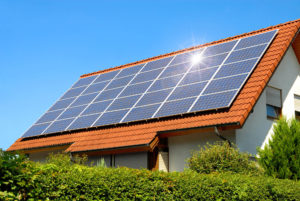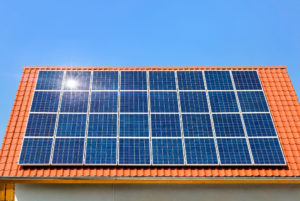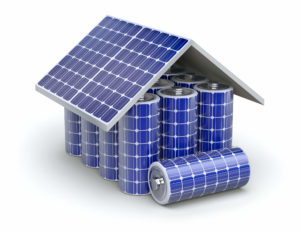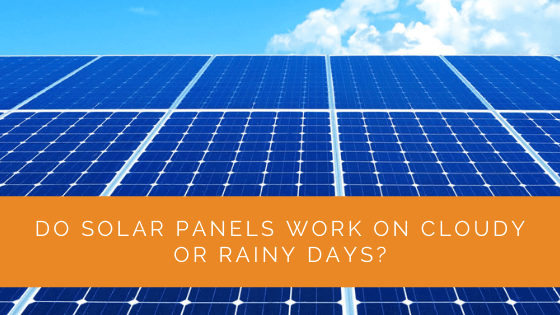All you need to charge your environment-friendly solar panels is a clear blue sky where the sun is shining upon you. But what happens on those not-so-sunny days? How do the rain and clouds affect solar panels?
There’s no denying that the power these solar panels generate in such weather will be relatively low.
However, several factors affect the energy generation capability of your solar panels.
This guide attempts to answer all your doubts about the efficiency of solar panels work on cloudy or rainy days. Let’s get started!
Contents
- 1 Key Takeaways
- 2 What is the Optimum Temperature for Solar Panels?
- 3 Do Solar Panels Work on Cloudy or Rainy Days?
- 4 Facts About Solar Panels in Overcast Weather
- 5 How Can Solar Panels Work on Cloudy or Rainy Days?
- 6 What is the Edge-of-Cloud Effect?
- 7 Are Solar Panels Efficient on Rainy Days?
- 8 Can Solar Panels Work on Snowy Days?
- 9 How Can I Navigate Through Rainy Days?
- 10 Case Study: Optimizing Solar Panel Efficiency in Varied Weather Conditions
- 11 Expert Insights From Our Solar Panel Installers About Solar Panels on Cloudy or Rainy Days
- 12 Experience Solar Excellence with Us!
- 13 The Bottom Line
Key Takeaways
- Solar panels can still generate electricity on cloudy or rainy days, with an expected output of 10% to 25% of their total capacity.
- The efficiency of solar panels is influenced by various factors, including temperature and the edge-of-cloud effect, which can enhance power production.
- To maximize solar panel efficiency in adverse weather, consider using batteries for energy storage, optimizing panel placement, and choosing high-efficiency monocrystalline panels.
What is the Optimum Temperature for Solar Panels?
Contrary to the belief that solar panel systems work best when warm, they do a better job in cold weather. Your solar panels will be able to generate more electricity at 77 degrees Fahrenheit than at 90 degrees Fahrenheit.
You can also refer to the Standard Test Conditions for more details on specific solar panel models.
Do Solar Panels Work on Cloudy or Rainy Days?
Homeowners often worry about the power flow due to solar panels on rainy and cloudy days.
Your concerns are valid if you live in a region like Northeast Florida. These places receive shower spells throughout the year.
Although the efficiency of your solar panels might stay low, you will still be able to get electricity. Expect 10% to 25% of your solar panel’s total capacity on a cloudy or rainy day.
Contrary to what many assume, even colder and rainy regions have solar panel-equipped homes due to the rising electricity costs.
Several top cities for solar panels in the US are not exactly gleaming and sunny. Take the example of San Francisco. Despite its hovering fog throughout the year, San Francisco is still among the top five cities for solar panels.

Facts About Solar Panels in Overcast Weather
Many exciting facts show that overcast weather is a lousy excuse for not installing solar panels. Take a look at some stats below:
- New York is not exactly famous for sunny weather. However, it has one of the highest consumption rates of solar energy.
- The UK is known for its rainy and overcast weather. Nevertheless, in recent years, the country is embracing solar energy production. Companies like Ikea recently launched solar energy storage systems for homes.
- Germany has a rainy and cold climate for most of the year. However, you’ll be surprised to know that Germany supplies upwards of 85% of its electricity through renewable energy. Also, Germany uses five times more solar power than the UK.
How Can Solar Panels Work on Cloudy or Rainy Days?
Even during overcast weather, the sun’s rays can still pierce through the dense clouds. Whether reflected or weak, modern-day PV solar panels are designed to absorb all types of light.
Note that solar panels absorb and convert the sun’s light and not its heat. For example, let’s consider that the clouds cover 25% of your solar panel. As a result, energy production will also reduce by 25%.
Infrared light is yet another reason why solar panels work on overcast days. Infrared light emits longer wavelengths compared to visible light. Because of this, infrared light rays penetrate clouds better than visible light rays.
Moreover, solar panels are not entirely dependent on direct sunlight. They also have the potential to harness light that bounces off surfaces.
Considering everything, solar panels can still work on a cloudy or rainy day.
What is the Edge-of-Cloud Effect?
The good news is that clouds can make your experience with solar panels a tad better. How is that possible?
Clouds can reflect and amplify the sun’s light to enhance your solar panel output.
This is due to the edge-of-cloud effect. Usually, when the edge-of-cloud effect takes place, the panels’ capability to produce power significantly increases.
You can notice the edge-of-cloud effect on a clear day. Angle your solar panels correctly to take complete advantage of this effect.
We suggest that you use a solar controller to track excess energy.

Are Solar Panels Efficient on Rainy Days?
As mentioned earlier, solar panels can still generate 25% electricity on a cloudy or rainy day. If you own a 1 kW solar panel system that produces about 5 kWh of power on a sunny day, the same panels will still give you 1.25 kWh on an overcast or rainy one.
Moreover, rain helps you maintain the panels by washing out the dirt and debris that often reduce efficiency by nearly 17%.
Furthermore, research on hybrid solar panels is still in the process. These hybrid solar panels can collect energy from both the rain and the sun.
Can Solar Panels Work on Snowy Days?
The snow may block sunlight by forming a layer on your solar panels. Anything that blocks the sunlight will reduce the efficiency of your solar panels.
However, even in snowy weather, solar panels do stand a chance of collecting some energy from the sun. How? If warm weather follows after a snowfall, the snow might melt and slip off your panels, resulting in their better exposure to sunlight.
Plus, you can prevent the snow from accumulating by positioning your solar panels in a tilted manner.
We understand that you might not have enough electricity to power your homes with just 25% solar panel efficiency. Don’t worry; we have some quick tips that’ll help you navigate through rainy days.
Use Batteries
If you have a set of good batteries, you can use them to store electricity from solar panels to power your home when it is raining or cloudy.
However, batteries tend to have a short lifespan. If you continuously charge and drain the batteries, they become more prone to damage.
The solar panels typically store any unused energy in these batteries. You can also buy batteries that come with the manufacturer’s warranty. Nevertheless, batteries are a fantastic way to ensure uninterrupted renewable electricity!

Pull From a Grid
With this, you can rely on the grid for energy supply even when your panels are underperforming.
If you have a grid connection at your home, you can channel all the extra energy that your solar panels generate.
The good thing is that these extra credits will save you on a cloudy or rainy day!
No Shady Spots
Whenever possible, try to avoid placing your solar panels in a shady area as it reduces their efficiency.
Besides, optimally tilting your panels towards the direction of sunlight will enhance energy collection during bad weather.
Use Monocrystalline Panels
Monocrystalline panels offer efficiency rates of up to 20% as they use purer cells.
In monocrystalline panels, the electrons flow freely, resulting in better efficiency. However, monocrystalline is not very budget-friendly.
Polycrystalline solar panels offer a lower efficiency at a more affordable price.
Optimize Consumption
Reducing your electricity usage is one of the easiest solutions on this list. You can navigate through a rainy or cloudy day with your solar panels by limiting your energy consumption.
You should consider regulating consumption, especially when your solar panels don’t have favorable conditions to perform.
Case Study: Optimizing Solar Panel Efficiency in Varied Weather Conditions
Background
At Solar Panels Network USA, we undertook a project to optimize the efficiency of a residential solar power system in an area known for frequent cloudy and rainy days. The homeowner was concerned about the potential drop in energy production during adverse weather and sought solutions to maintain a reliable energy supply year-round.
Project Overview
The main objective was to implement strategies and accessories that would maximize the solar panels’ efficiency even during overcast conditions. This included using high-efficiency panels, proper panel placement, and integrating energy storage solutions.
Implementation
The project involved a comprehensive approach to enhance the solar power system’s performance, focusing on key areas such as panel type, placement, and energy storage.
Key steps included:
- Initial Consultation and Assessment: We conducted an in-depth consultation to understand the homeowner’s energy needs and concerns about weather-related performance drops. An assessment of the existing system was also carried out to identify areas for improvement.
- Selection of High-Efficiency Panels: Based on the assessment, we recommended switching to monocrystalline panels, known for their superior performance in low-light conditions. These panels offer higher efficiency rates, ensuring better energy production on cloudy days.
- Optimized Panel Placement: Using advanced modeling tools, we determined the optimal placement and tilt angle for the panels to maximize sunlight exposure throughout the day, considering the local weather patterns.
- Integration of Energy Storage Solutions: We installed high-capacity solar batteries to store excess energy generated on sunny days. This stored energy could then be used during cloudy or rainy days, ensuring a continuous power supply.
- System Monitoring: Advanced monitoring technology was set up to provide real-time data on energy production and consumption. This allowed the homeowner to track the system’s performance and make informed decisions about energy usage.
Results
The enhancements led to significant improvements in the solar power system’s reliability and efficiency, even during adverse weather conditions.
- Consistent Energy Supply: The integration of batteries ensured that the homeowner had a reliable power source even on the cloudiest days. The stored energy bridged the gap when solar production was low.
- Improved Efficiency: The high-efficiency monocrystalline panels performed exceptionally well in low-light conditions, maintaining a consistent energy output.
- Optimized Performance: The strategic placement of the panels maximized sunlight exposure, enhancing overall energy production.
- Real-Time Monitoring: The monitoring system provided valuable insights into energy production and consumption, allowing the homeowner to optimize their energy usage and maintain system efficiency.
Summary
This case study demonstrates how Solar Panels Network USA successfully optimized a residential solar power system to ensure reliable energy production in varied weather conditions. By integrating high-efficiency panels, proper placement, and energy storage solutions, we provided the homeowner with a sustainable and dependable energy source. Our commitment to quality and innovation continues to support our clients in achieving their renewable energy goals, regardless of the weather.
Expert Insights From Our Solar Panel Installers About Solar Panels on Cloudy or Rainy Days
Solar panels can still generate electricity even on cloudy or rainy days. While the efficiency is reduced, they can produce around 10% to 25% of their total capacity, making them a reliable source of energy in varied weather conditions.
Senior Solar Installer
Using high-efficiency monocrystalline panels and optimizing their placement can significantly enhance power production on overcast days. These panels perform better in low-light conditions compared to other types.
Lead Solar Technician
Integrating batteries into your solar power system is an excellent way to ensure a consistent energy supply during cloudy or rainy days. Stored energy can be used when panel output is low, providing reliability and peace of mind.
Chief Installation Engineer
Experience Solar Excellence with Us!
Trust in Solar Panels Network USA, where our seasoned experts deliver top-quality solar solutions for homes and businesses nationwide. With a legacy of countless successful installations and a commitment to sustainable energy, we’re your reliable partner in the solar journey. Ready for a brighter, eco-friendly future? Call us now at (855) 427-0058 and harness the power of the sun!
The Bottom Line
So, can solar panels work on cloudy and rainy days? The answer is yes; they can!
Although the efficiency of solar panels reduces depending on the weather, you can still expect some power generation.
Solar panels are designed to allow them to trap any light. Besides, it is not the sun’s heat but its light that powers the solar panel.
Moreover, monocrystalline panels offer the best efficiency. You can also consider installing batteries to store up energy for cloudy or rainy days.
About the Author
Solar Panels Network USA stands at the forefront of solar energy solutions, driven by a team of seasoned solar engineers and energy consultants. With over decades of experience in delivering high-quality solar installations and maintenance, we are committed to promoting sustainable energy through customer-centric, tailored solutions. Our articles reflect this commitment, crafted collaboratively by experts to provide accurate, up-to-date insights into solar technology, ensuring our readers are well-informed and empowered in their solar energy decisions.

